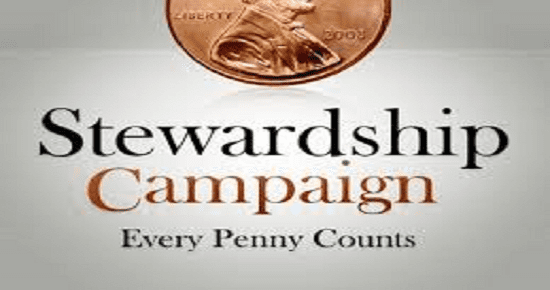One of the unexpected pleasures that has come my way over the past few years is the occasional opportunity to step behind the pulpit at the Episcopal church Jeanne and I attend and give the Sunday sermon. Although I’ve been a college professor for close to twenty-five years, sermonizing is a different animal altogether than teaching. It’s a bit intimidating. The most challenging sermon was when the rector asked me to give the sermon on an October Sunday to kick off the annual stewardship drive. “Stewardship?? Me??” I was confused. Here’s what I said.

A few weeks ago I was having a beer at the local watering hole on a Friday afternoon with a new colleague in the philosophy department. The next day I sent him the link to my blog; he commented favorably on one of my posts. I’ve learned that blog etiquette required that I now ask him if he has a blog and if he does to go take a look. He does and I did. His latest post was about a recent distasteful experience during mass at the Catholic Church in his neighborhood that many of my Catholic friends and colleagues attend. Here’s an excerpt:.
I had a horrible experience at mass today, and many of you have heard me speak about these issues before, but just to emphasize — Preach the Word, not the dollar.
Growing up, many of my Protestant friends would say that they didn’t like to go to church because the preacher was always asking for money. I was very proud that Catholic priests never asked for money at mass. Then one Sunday several years ago, I had my first experience of a priest asking for money during the homily. I just could not receive communion after being so offended by the mass.
Over the following years, I watched carefully for “mission” or “stewardship” Sunday and would not attend mass on those days.
Today, I attended mass at a parish close to where I work. Today’s readings were beautiful, but the pastor delivered a lackluster “homily” about how important faith is. He then went on for at least ten minutes — much longer than his homily — to talk about a new program the church has signed up for. Now, individuals and families can use this on-line system to have automatic deposits of their weekly donations into the church account instead of using paper envelopes each week. The man was inspiring almost.
And it took everything I had not to walk up to him during his homily to denounce it!
I should have perhaps, but I was, in the end, not courageous enough because so many of my new colleagues attend this mass.
And there you have it. Stewardship, pledge-drives—the closest things to a four-letter words you are likely to hear in church.
I come from the Protestant world my colleague is talking about, where pleas for money came in various forms from the pulpit on an almost weekly basis. My father, an itinerant Baptist minister, was embarrassingly shameless in his appeals for money. As preacher’s kids, my brother and I often wore clothes that came out of a missionary barrel. Money and God have had a negatively mysterious relationship in my imagination for most of my life.
So imagine my surprise when Marsue let me know that my name had come up in a stewardship committee meeting, of all places. Would I write something on the topic for the online newspaper, on my blog, for an after-service seminar? Imagine my even greater surprise when I found myself writing back suggesting that maybe I could do a sermon followed by a discussion seminar after church? Trust me; there is no person in this room less likely to have anything constructive to say about stewardship than I. But here we are—so let’s talk.
Recently while on one of the many business trips she takes every fall, Jeanne picked up a book in an airport shop to read on the coast-to-coast flight. She was so taken by the book that she passed it on to me as a “must read” when she returned home. At first glance, it looked to be much more her sort of book than mine. The book is Kisses from Katie: A Story of Relentless Love and Redemption, by Katie Davis. During Christmas break of her senior year in high school, Katie went for a short missionary trip to Uganda, and her life was turned upside down.
Upon graduating from high school, Katie chose—instead of going to college or marrying her boyfriend—to go back to Uganda. She was so moved by the needs she saw there, particularly among orphaned children, that she knew she had found her vocation and calling. Now, at the ripe old age of 22, she is in the process of adopting thirteen children and has established a non-profit ministry that feeds and sends hundreds more children to school. To be honest, this is more Jeanne’s sort of book than mine, because Katie is the sort of person who has always driven me crazy, causing me to feel guilty and to feel like a spiritual midget because there’s nothing in my life even remotely resembling her spectacular commitment to faith and Jesus.
The children she is fostering call her Mommy; Katie reports that they ask the never-ending questions that all children ask.
“Mommy, where does the sun go when I am sleeping?”
“Mommy, are all ladybugs girls?”
“Mommy, where do I go when I die? Do fish go there too?”
“Mommy, why don’t fish breathe air?”
“Mommy, what makes the sky blue?”
“Mommy, why is your skin different from mine?”
My guess is that any of you who have had children have heard hundreds of such questions. But the question that most surprised Katie Davis is one that I, at least, never heard from either of my sons:
“Mommy, if Jesus comes to live inside my heart, will I explode?”
Katie’s quick response was “No!” But after a bit of thought, she changed her answer.
“Yes, if Jesus comes to live in your heart, you will explode. You will explode with love, with compassion, with hurt for those who are hurting, and with joy for those who rejoice. You will explode with a desire to be more, to be better, to be Jesus in this world.”
Not only do I think she is right, I think her insight is the key to understanding what stewardship really is. That’s the point of today’s gospel reading.
James and John are looking for a little payback for all of their efforts, and in the process are doing a brotherly end run on the other disciples. “Jesus, can we reserve the two best seats next to you in heaven?” The other disciples get angry, not because James and John asked, but because the brothers thought of it first. Jesus’ response is both cryptic and powerful. “Whoever wishes to become great among you must be your servant, and whoever wishes to be first among you must be slave of all.” I suppose the disciples (and we) should get used to this backwards and upside-down perspective from Jesus, since it’s the sort of thing that He consistently says. But it’s jarring every time. At its heart, everything about following Christ is backwards. “The Son of Man came not to be served but to serve.” And we here this morning are called to be the Son of Man, Jesus, in the world. We are called to be stewards of the divine in us, bringing it into the world in ways unique and special to each of us.
So what does lived stewardship look like? It begins with each of us asking “What are the unique ways Christ can enter the world through me?” The easiest thing in the world to do is write a check and pledge to write fifty-one more checks over the next year. And Marsue [the rector], Stephan, Bill [the Senior and Junior Wardens] and the vestry will tell you that this place cannot run without those checks and pledges. But simply writing a check is not stewardship—writing a check to Trinity is no more unusual or praiseworthy than paying the bill at the restaurant or supermarket where you get your food. Stewardship requires a great deal more, the sorts of things that the rich young man in last week’s gospel could not do. Stewardship is another name for the holy explosion that takes place when we decide to let the divine within us out.
All of that awesome divine power we heard about from Job this morning . . .
Where were you when I laid the foundation of the earth? Tell me, if you have understanding. Who determined its measurements–surely you know! Or who stretched the line upon it? On what were its bases sunk, or who laid its cornerstone when the morning stars sang together and all the heavenly beings shouted for joy?
That divine power is in us. It is up to us to be Christ in the world. We may not all be called to be saints or missionaries or priests or even go to Uganda. But each of us is called to be stewards of the gift that is in us, letting it explode into the world around us in uniquely creative ways.
The most memorable line from the person who led the retreat/workshop that I attended in Minnesota two months ago is a simple one: On several occasions she said, “Be where you are, and do what you are doing.” Be present now, rather than regretting the past or anticipating the future. Stewardship asks us to do the same thing. Be Christ where you are. Right now.












